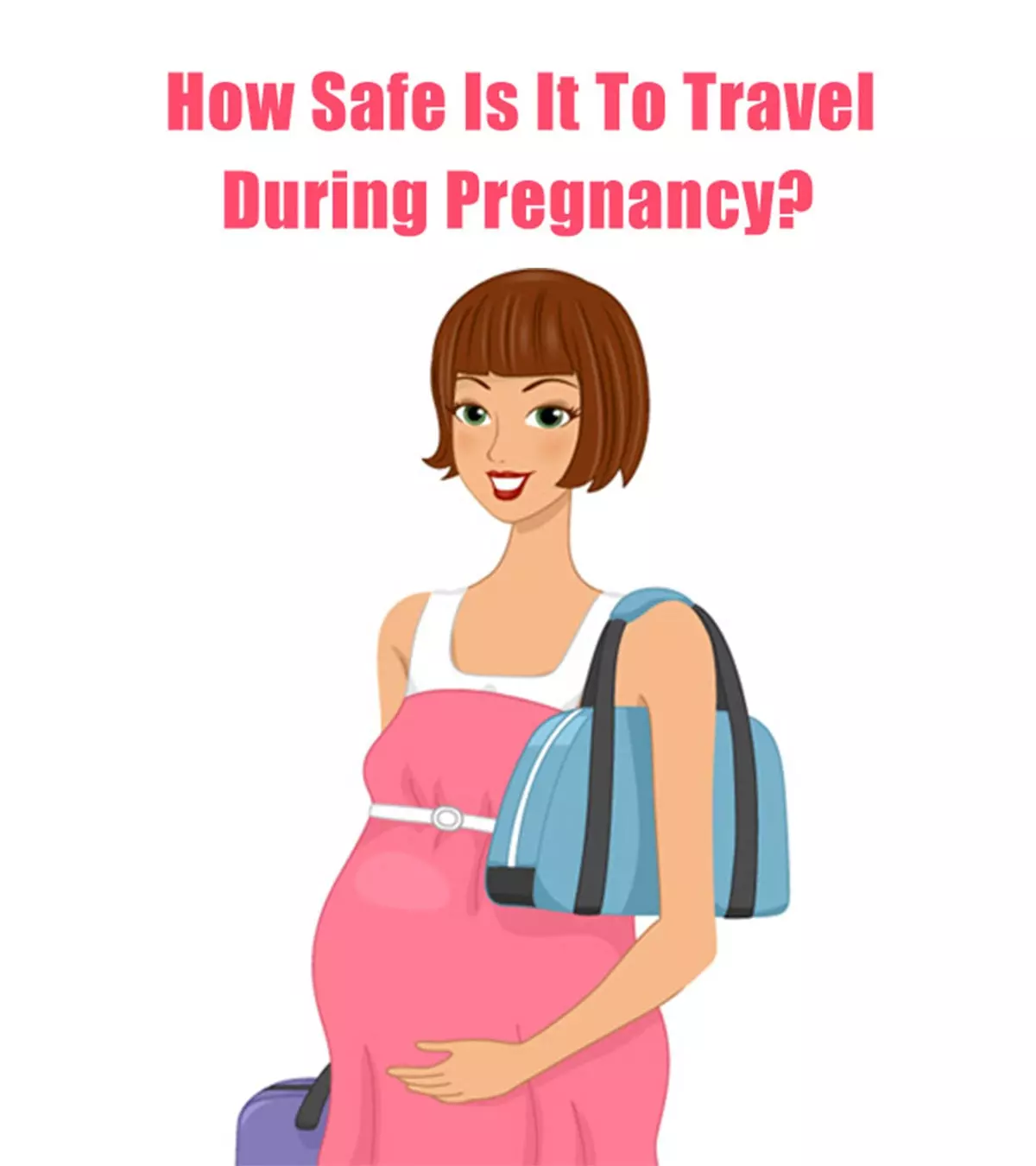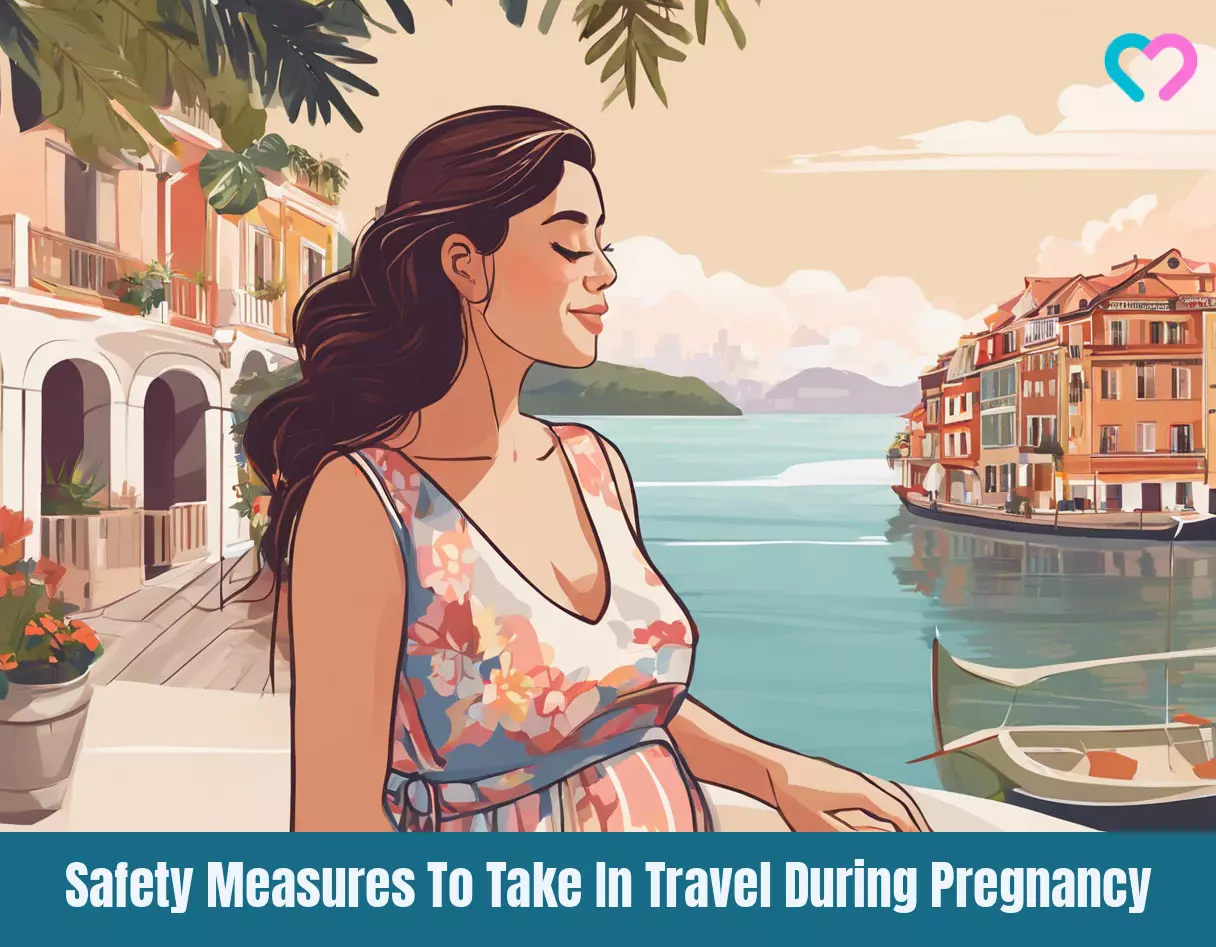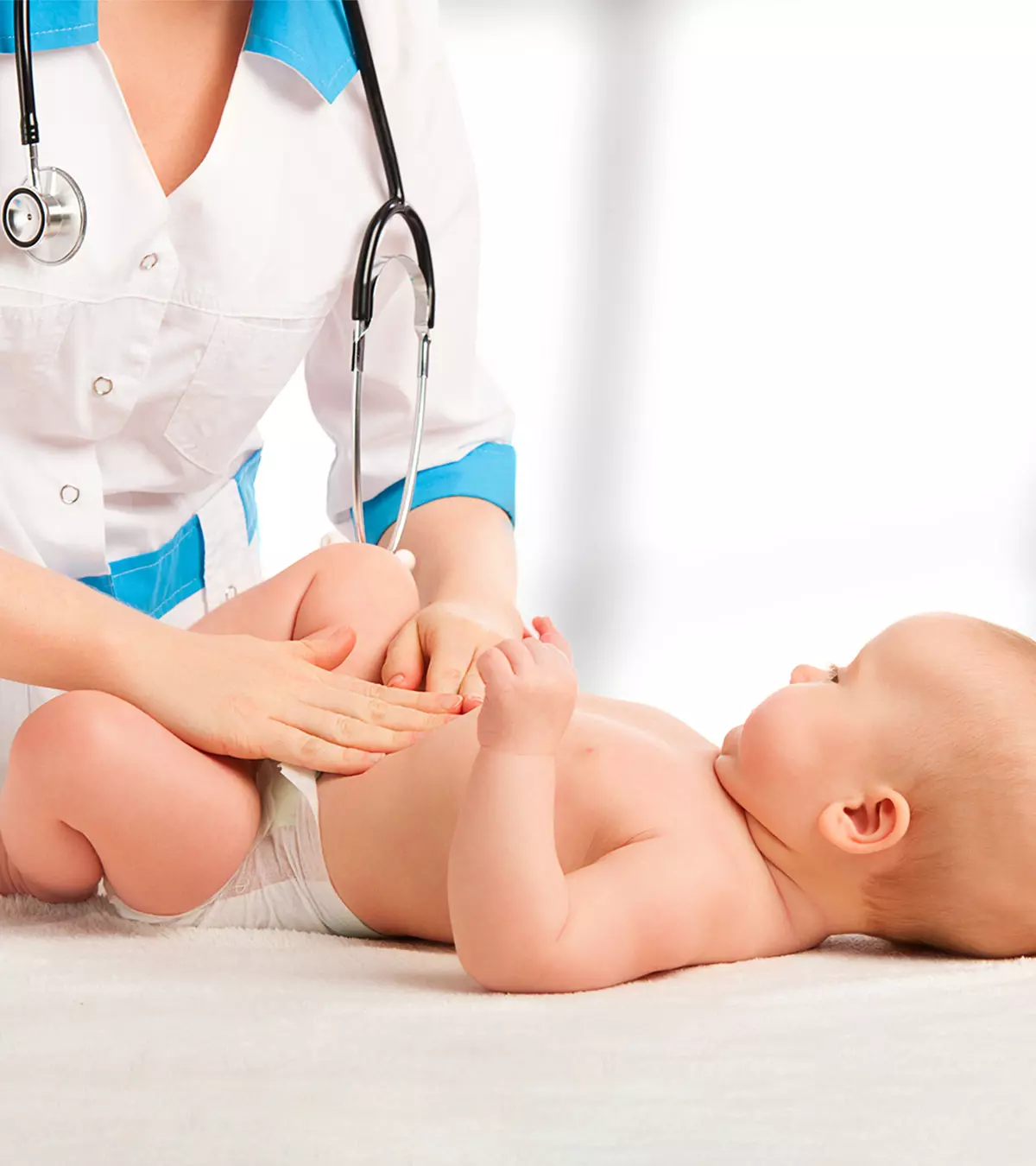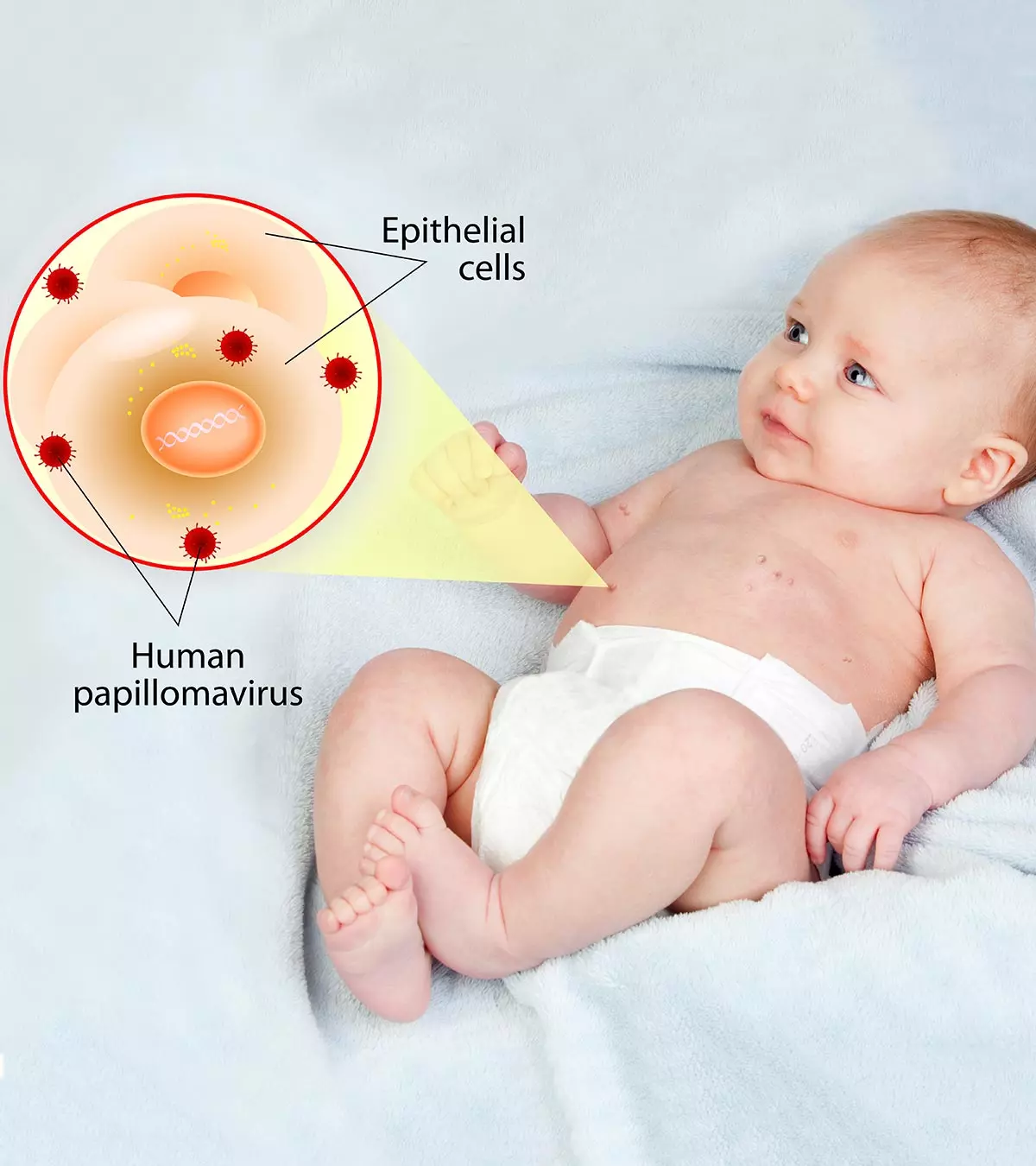
Image: MomJunction Design Team
If you wish to travel during pregnancy, it is essential to understand that every woman is different, and hence the rules may differ for everyone. You may avoid traveling while pregnant if you have a history of a failed pregnancy, complications such as diabetes, or other problems. Even if you get the clearance, certain things need to be followed for a safe, harmless joyful trip.
So you should consult your ob-gyn traveling to avoid any unfortunate situation. This post will tell you about all that is to know while traveling in pregnancy, including the dos and don’ts and some safety tips to follow.
Key Pointers
- If you have gestational diabetes, high blood pressure, multiple pregnancies, or other pregnancy complications, your doctor may advise against travel.
- When flying, ensure to select an aisle seat, drink plenty of water to avoid dehydration, and request assistance if you experience discomfort.
- When driving, place a pillow between your back and the seat, fasten your seatbelt below your stomach, and take frequent breaks to stretch.
- If opting for sea travel, avoid public swimming pools and hot baths, limit time spent on the deck, and refrain from eating local delicacies at ports.
- Train travel can be beneficial as it involves fewer jerky movements, provides ample legroom, has a designated lying area, and minimizes nausea.
When Your Doctor Might Say No To Travel?
It is important to consider the risks associated with traveling during pregnancy, and you can best understand it from your doctor. If they say you have some complications and ask you not to travel, then please don’t.
Here are some situations in which the doctor may ask expectant mothers to avoid traveling during the early weeks of pregnancy(1):
1. History Of Preterm Labor Or Miscarriage:
If you had a miscarriage in the past or anyone in your family experienced miscarriage, you need to be extra careful. You might not be able to prevent a preterm labor because it is difficult to detect it, but you can ensure a healthy and safe pregnancy.
Other than having a healthy diet and taking prenatal care, you have to restrict heavy exercise and travel during the pregnancy. You need to meet your doctor more often for physical examination and tests to see the status of your pregnancy. You need rest if you want a healthy baby. You also need to take preventive medications like weekly shots of a type of progesterone hormone called hydroxyprogesterone caproate (Makena) during the second trimester.
Also using vaginal progesterone gel during the second and third trimesters can reduce the risk of preterm labor, especially in women with a short cervix. So it is important not to miss your weekly shots and your visits to the doctor. So traveling is definitely not on the list (2)
2. Multiple Pregnancies (Twins, Triplets Or More):
Twins and triplets are usually born early so it is important to talk to your doctor midwife about the birth options. If you are due to have multiple pregnancies, it is important to take special care. Generally, twins and triplets are born before 38 weeks; more than half of all twin pregnancies go beyond 37 weeks. Nearly 75% of triplets are born before 35 weeks (3).
So naturally your doctor will say not to travel in this delicate condition during the third trimester. Since you can enter into labor anytime and it is best to take the precautionary measures, stay home and take rest.
3. High Blood Pressure:

Image: Shutterstock
If you develop high blood pressure or hypertension during pregnancy it is important that you take precautions and enough rest. Since, high blood pressure can cause complications during delivery. Generally, high blood pressure occurs during conception or during the pregnancy. According to the Centers For Disease Control and Prevention (CDC), high blood pressure among pregnant women is quite common in the US. The data suggests one in every 12- 17 pregnant women aged between 20-44 experience hypertension.
High blood pressure during pregnancy poses various risks like decreased blood flow to the placenta. Thus the fetus is deprived of oxygen and nutrients necessary for development. This is a reason behind low birth weight. High blood pressure can cause placental abruption or separation of placenta from the uterus wall. This is a serious condition since it can cause heavy bleeding in the mother and deprive the fetus of oxygen. Some high pressure can trigger premature delivery to avoid all life threatening complications. If the woman develops preeclampsia and high protein content in the urine after 20 weeks of pregnancy then there is a high chance that she will develop cardiovascular disease later in life even if the pressure comes back to normalcy after pregnancy.
Chronic hypertension generally begins before pregnancy and lasts more than 12 weeks after delivery. Gestational hypertension develops 20 weeks after pregnancy is detected. It is temporary and it disappears after delivery. Sometimes both chronic and gestational hypertension can cause preeclampsia; it is a serious condition that can cause life threatening birth complications. If you have constant headaches, blurred vision, abdominal pain on the right side, sudden weight gain, and edema or swelling of hands and feet it is a sure sign of preeclampsia in pregnancy and it needs immediate medical attention (4). It is best to take rest and keep a calm mind if you are suffering from hypertension.
It is best to rest and keep a calm mind if you are suffering from hypertension. Rule out all travel as rest and maintaining good health should be the priority. Travel will tire you out and may further complicate situations.
4. Placental Abnormalities:
If you are suffering from placental abruption, this means the placenta detaches itself from the uterine wall suddenly posing danger to both mother and baby. Also placenta praevia or low lying placenta can block the mouth of the cervix; this is also a serious pregnancy complication that needs to be resolved.
The woman experiences heavy bleeding if she suffers from either placenta previa or placental abruption. So it is not a wise idea to travel in this delicate condition and subject oneself to more discomfort. Placental disruptions pose a risk to both fetus and mother’s health so it is important to stay at home and take rest and medications (5). So you need to concentrate on the treatment of these conditions.
5. Gestational Diabetes:
If a woman develops diabetes during pregnancy it is termed gestational diabetes. Nearly 2-10% of pregnant mothers develop diabetes or high blood sugar.
Generally the food we eat gets broken down into glucose, the insulin produced by the pancreas helps to use the glucose as fuel to run the normal body process. What if the pancreas does not produce enough amounts of glucose or the cells in the body can’t react to the insulin then glucose remains unutilized in the body and automatically raises the levels of blood sugar. The hormonal changes in the body make the cells less responsive to insulin thus increasing the risk of gestational diabetes.
Even if you have not developed gestational diabetes and you have a family history of diabetes then you need to be extra careful. Since diabetes during pregnancy can cause birth complications (6). So avoid traveling if you have gestational diabetes since you need enough rest.
6. Incompetent Cervix:
There is no definitive cause behind incompetent cervix. It can happen due to uterine or placental abnormalities, extensive cervical biopsy, exposure to drug DES and previous childbirth can weaken the cervix. A weak cervix further increases the risk of complications during delivery. It is important to get immediate medical assistance and take medications if necessary. It is vital to take bed rest if you have incompetent cervix.
Generally incompetent cervix is diagnosed by manual examination or vaginal ultrasounds. Nearly 20-25% of pregnancy gets terminated due to incompetent cervix during the second trimester. If the cervical opening is more than 2.5 cm and if the cervical length has shortened to 20mm then the doctor will write it off as incompetent cervix. The funneling of the cervix is also a sign of incompetent cervix. If you suffer from incompetent cervix you will experience heavy discharge and feeling of heaviness in the pelvis. This happens when a dilated cervix feels the pressure exerted by the bag of water.
A dilated cervix doesn’t cause pain unless there is a rupture in the membrane which triggers the onset of labor. When the bag of water crosses the birth canal it protrudes out of the cervix. This is a serious condition and is often undetected until premature labor or birth takes place. So it is best to avoid travel during the third trimester to reduce the risk of preterm labor and premature birth. You can’t actually prevent it really but can ensure a safe pregnancy by taking adequate rest (7).
7. History Of Bleeding During Pregnancy:
Heavy vaginal bleeding can happen throughout pregnancy. Though spotting is normal in the first trimester, it is not the same as vaginal bleeding caused due to placental complication and intrauterine birth. If you are already experiencing bleeding during pregnancy it will be prudent to drop the idea of a holiday and a long distance travel.
8. History Of Pre-eclampsia Or Ectopic Pregnancy:
If you are experiencing bleeding and discomfort due to preeclampsia and intrauterine or ectopic pregnancy it is not safe to travel at all. When the embryo implants itself on the walls of the fallopian tube or pelvic cavity instead of the uterus or womb then ectopic pregnancy occurs.
Ectopic pregnancy can cause a rupture of the fallopian tube and that can be life threatening for both the mother and the baby. Also if the mother suffers from preeclampsia along with ectopic pregnancy, then it is a serious condition and total bed rest is advised by the doctor to ensure safe delivery (8). If the woman has already suffered a spontaneous abortion due to ectopic pregnancy then also traveling is not a good idea.
Besides these, there could be other reasons why your doctor might forbid any travel during pregnancy. In case none of these complications exist, your doctor might allow you to travel during pregnancy. Most doctors permit travel in the second trimester, but may ask you to avoid it during the first and third trimesters.
Some Dos and Don’ts for Traveling during Pregnancy

Image: IStock
Luckily for you, if you have a healthy pregnancy and are about to travel, follow these tips to ensure that you are better prepared.
- DO pack your medical file containing your latest ultrasound report, your prescription and prenatal records.
- DO consider getting travel insurance to make room for any complications.
- DO keep extra medications.
- DO share your doctor’s contact details with the people traveling with you.
- DO ask your doctor about any immunization you need.
- DON’T lift heavy luggage.
- DON’T use any new medication purchased in a foreign nation.
 Quick tip
Quick tipAir Travel – How to Ensure Safety
For women with complications mentioned above, air travel is probably the safest mode of travel. It keeps the body stationary, involves no abrupt stop and jerks and takes lesser time than other modes. Here is some rational advice for those planning to travel by air during pregnancy (9):
1. Before Take-Off:
Pack all necessary medications and also some ORS sachets and antacids; wear roomy, comfortable shoes to accommodate any swelling and wear loose fitting clothes.
2. At The Check-In Counter:
Request an aisle seat (to make running to the washroom every 10 minutes easier) and a seat near the exit (the extra room gives you more leg space); ask to be searched manually or by wand instead of going through the airport security scanners during pregnancy.
3. In The Air:
- Wear your seat belt constantly.
- Drink plenty of fluids to avoid dehydration.
- Do ankle and leg stretches during long flights to avoid the risk of swelling in the feet and, more seriously, clotting due to high cabin pressure.
- If possible, walk around after every hour.
- Most importantly, don’t hesitate in asking for assistance if you feel nauseous, dizzy and disoriented.
Traveling by air could be uncomfortable for women in their third trimester as many airlines do not have special arrangements for them. Plus, you might feel a little uncomfortable moving around.
The most important thing is to remember not to put your unborn child at any unnecessary risk. Read, listen to music, think calming thoughts and catch up on some sleep. If at all you feel the need, visit a doctor upon landing.
Natalie Parker from the San Francisco Bay Area shares her preparation for a 10-hour flight to London at 28 weeks gestation. She writes. “Different airlines have different rules about how far into the pregnancy you can travel. Some require a doctor’s note after a certain point. My airline requires a note at 28 weeks.
“While I don’t technically need one on the way there, I will carry one. I recommend carrying one if you’re showing even if your entire trip will occur before the deadline — you never know what a gate agent will say. I’ve purchased a “cancel for any reason” policy which will allow me to stop the trip if I just don’t feel up to going (i).”
Car Travel – How to Feel Comfortable Over the Miles
Car travel is another option that suits most pregnant women, especially if traveling over short distances. Car travel protects travelers from the long check-in time typically involved in air travel. There is no risk of high altitude sickness as opposed to air travel. Car travel is also more comfortable as you can take intermittent stops and even turn back (or stop at a convenient place) if something goes wrong. Here are some things to keep in mind while traveling by car during pregnancy (10).
1. Preparing For the Drive:
Whether you need to drive within the city or to another destination, always keep a copy of your prenatal records in the car. Carry a working mobile phone and preferably turn on GPS (if possible) to make tracking easier.
2. On The Road:

Image: Shutterstock
Once on the road, here are some must-do pointers:
- Always keep your seat belt latch under the belly.
- If you are the one driving the car, move the seat as far back as possible
- Push the seat all the way back if you are the passenger.
- Drink plenty of fluids, especially if you are traveling in pregnancy on a hot day and keep munching on something to avoid nausea.
- Stop occasionally and stretch your ankles and feet.
- Keep a small pillow between your back and the seat to avoid back pain later.
If there is even a minor accident, check if you have any contractions or bleeding and consult a doctor as soon as possible.
 Point to consider
Point to consider3. At The Destination:
After a long journey, try to get some rest before anything else. Rehydrate the body and have a light snack. Avoid another long journey without having ample rest. Though car travel is safe, there is always the possibility of sudden jerks and stops. If the roads are bad, you are sure to have an uncomfortable time. Intra-city car travel usually poses no bigger problems than nausea and can be done easily with a little extra care.
Sea Travel – Cruising With Your Baby Bump
So, you choose to take a cruise during pregnancy? It is completely fine as long as you don’t suffer from more than normal seasickness. If you feel comfortable and safe, by all means, take that long-planned cruise and enjoy! Some tips to plan for and follow during a sea voyage during pregnancy:
1. Before You Set Off:

Image: Shutterstock
- Pack extra doses of all your medications to suffice for the whole voyage
- Keep your prenatal records and prepare a diet chart of things you can and cannot eat from the ship’s kitchen.
- Check the entire schedule of the cruise, including duration between port stops. Check and verify safety measures on the vessel.
Consult the Center for Disease Control and Prevention office to check that the vessel has cleared all inspections, if in the USA. Or check with any other respective prevention control offices of the country you chose for cruising (11).
2. On The Cruise:
- Don’t stay on the deck for too long to avoid sunburn and overheating.
- Maintain adequate hydration.
- Eat nourishing food.
- You have a lot of space for walking – take 30 minute walks daily.
3. Things To Avoid:
- Avoid eating seafood as it contains methyl mercury that can hamper fetal brain development.
- Avoid slippery places where you can slip and fall.
- Avoid having local food at port stops.
- Avoid swimming in common pools to avoid risk of infections, opt for a private pool or Jacuzzi instead.
- Avoid all kinds of water sports and adventure sports.
4. At The End:
As soon as you disembark, visit your doctor for anything that troubled you on the voyage.
Is It Safe To Travel In A Train During Pregnancy?
As most doctors suggest, train travel is the best bet you have if you are pregnant. There are no sudden turns or jerks, the stopping and starting of the train is gentle and non-jarring. If you are in a sleeper coach, you have lots of legroom and also a place to lie down. There are lots of people around to help you if need be and train travel does not trigger nausea, even in the first trimester! Some things to keep in mind for train journeys are (12):
1. Before You Leave:
- Book a ticket on the train with the least amount of stops.
- Pack a cushion or pillow to support your back.
- Try reserving a lower berth so it is easier to rest.
- At the platform, try seeking help to get your luggage on board.
- If you are traveling by chair car, inform the TTE of your condition and ask to be given a seat close to the washroom.
- Avoid traveling alone, if possible.
- Don’t try to board a moving train!
- Rest your legs, feet and back as much as you can.
- Avoid buying eatables from vendors, buy fresh fruits instead.
- Don’t disembark at train stops; try not to move between two coaches or use the washroom while the train is moving.
- Wear comfortable clothes and shoes.
- Flex your legs and walk around every now and then to prevent swelling in the legs and feet.
- Allow others to get off first to avoid the rush.
- Ask a porter to unload your luggage.
- Be wary of slippery steps while disembarking.
2. Enroute:
- Rest your legs, feet and back as much as you can.
- Avoid buying eatables from vendors, buy fresh fruits instead.
- Don’t disembark at train stops; try not to move between two coaches or use the washroom while the train is moving.
- Wear comfortable clothes and shoes.
- Flex your legs and walk around every now and then to prevent swelling in the legs and feet.
- Allow others to get off first to avoid the rush.
- Ask a porter to unload your luggage.
- Be wary of slippery steps while disembarking.
3. While Disembarking:
- Allow others to get off first to avoid the rush, especially when you travel by bus during pregnancy.
- Ask a porter to unload your luggage.
- Be wary of slippery steps while disembarking.
Other Tips For Traveling During Pregnancy

Image: IStock
Those who are traveling to developing countries need to be vaccinated against typhoid. However, some vaccines are harmful for the developing fetus. Some vaccines are unsafe because they have not been tested on pregnant women. Generally all live viral vaccines like mumps and measles should be totally avoided during pregnancy. Some vaccines for yellow fever can be administered under doctor’s supervision after the first trimester. But it is not safe to travel to developing countries during pregnancy, especially if your immune system is not very strong. Keep all travels reserved for post pregnancy.
If you are aged above 35 years and you happen to be pregnant for the first time it is best to avoid travel.
It is better not to travel to tropical countries during pregnancy since pregnant women can come into contact with malaria infection due to bite from a mosquito. Since malaria increases the risk of stillbirths, miscarriage and premature labor. Also anti-malarial drugs like doxycycline are potentially harmful for the baby. So avoid traveling to malaria prone areas.
Restricted movement inside the bus, car, plane or any other mode of travel during pregnancy can cause deep vein thrombosis. (DVT) or clots in the deep veins of the legs. These clots can circulate and can lodge in other parts of the body like lungs.
The risk of deep vein thrombosis increases if you are obese, had DVT in the past or have a family history of DVT. Deep vein thrombosis is very common and it becomes more acute with long distance travel. If this travel plan is very important and can’t be avoided, it is best to wear elastic below knee compression stockings, discuss your travel schedule with your doctor and write down a list of do’s and don’ts and follow them strictly. Do frequent leg exercises, if you are traveling by plane then walk inside the aircraft to ensure proper blood circulation. Also avoid dehydration but avoid caffeine and alcohol entirely.
Traveling during a healthy pregnancy is no problem at all if you take all possible precautions. The second trimester is the safest time to travel if your doctor grants you the permission to travel. But above all, remember that no journey or voyage, for any reason whatsoever, is worth more than the safety of your unborn child. Therefore, follow your doctor’s instructions while planning a journey. When in doubt or when the travel plan can be postponed, always schedule it after the baby has arrived (1). Also, always prioritize your comfort while traveling.
Frequently Asked Questions
1. How long can a pregnant woman travel?
You may consult your Ob/Gyn for how long you may travel since the safe duration could vary. Generally, it is advised not to travel for more than four hours. If you have no choice but to travel for a long duration, keep yourself hydrated and move/walk every 30 minutes. Many airlines may not allow you to travel after 36 to 37 weeks of pregnancy. Some may even restrict travel without a doctor’s written approval once you are 28 weeks pregnant (13).
2. Why is traveling not good for pregnancy?
Traveling requires long hours of inactivity, which may increase the risk of dizziness and fatigue. Traveling for several hours may also increase the risk of severe problems, such as blood clots (deep vein thrombosis), which may have detrimental effects on maternal and fetal health. Hence, for these reasons, traveling is best avoided, especially in the first and third trimesters (14).
3. Can air travel harm the developing fetus?
No evidence suggests that air travel in healthy women with an uncomplicated pregnancy may cause any harm to the fetus. However, it is best to consult your doctor before you travel by air, especially in cases of existing medical conditions or pregnancy complications (17).
4. How can pregnant women cope with jet lag while traveling?
Pregnant women can cope with jet lag by booking a flight around the timings of their natural sleep cycle. It can minimize the time required to adapt to their new destination. Also, taking short naps during the flight, staying hydrated during and after the flight, exposure to sunlight, and ensuring a small amount of caffeine in the morning after travel might help them adapt to the new cycle (18).
5. What foods should pregnant women avoid while traveling abroad?
Pregnant women need to avoid cold foods, raw or deli meat, bushmeat, seafood, precut fruits or vegetables, uncooked salads (even if it is freshly made), unpasteurized cheese, salsas and sauces that contain raw ingredients, fountain drinks, tap water, and ice while traveling abroad, as these may have the risk of being contaminated by bacteria (19).
The safety and risks of travel during pregnancy may vary depending on individual factors. It can be safe for many women to travel during pregnancy at any trimester. While a few may have to restrict travel to the mid-trimester due to intense pregnancy symptoms. It is always recommended to seek your doctor’s advice to know what is best for you. Avoid traveling if the doctor restricts it due to possible risks and complications. You may also take necessary precautions while traveling, depending on your mode of transport.
Infographic: Tips On Using Different Modes Of Transportation During Pregnancy
In most uncomplicated pregnancies, traveling is considered safe and is recommended by most doctors. However, since your body changes a lot during pregnancy, you must take adequate precautions while traveling. Here is a list of tips that may help you travel safely during pregnancy. Illustration: Momjunction Design Team
Illustration: Safety Measures To Take In Travel During Pregnancy

Image: Stable Diffusion/MomJunction Design Team
A pregnant woman needs to be extremely careful while driving. Get tips on how to adjust your driving habits for a safe and comfortable ride with this video.
Personal Experience: Source
MomJunction articles include first-hand experiences to provide you with better insights through real-life narratives. Here are the sources of personal accounts referenced in this article.
i. Pregnant And Traveling: London Booked At 7 Months.https://almostneverclever.wordpress.com/2017/01/09/pregnant-and-traveling-london-booked-at-7-months/
References
- Pregnancy and Travel.
https://www.betterhealth.vic.gov.au/health/healthyliving/pregnancy-and-travel - Errol R Norwitz and Aaron B Caughey; (2011); Progesterone Supplementation and the Prevention of Preterm Birth.
https://www.ncbi.nlm.nih.gov/pmc/articles/PMC3218546/ - Guideline: Twin and triplet pregnancy.
https://www.nice.org.uk/guidance/ng137/documents/draft-guideline - High Blood Pressure in Pregnancy.
https://medlineplus.gov/highbloodpressureinpregnancy.html - Kimberly M et al.; (2022); Placenta Abnormalities.
https://www.ncbi.nlm.nih.gov/books/NBK459355/ - Gestational diabetes
https://www.cdc.gov/diabetes/about/gestational-diabetes.html - Monika Thakur and Kunal Mahajan; (2021); Cervical Incompetence.
https://www.ncbi.nlm.nih.gov/books/NBK525954/ - Ectopic pregnancy.
https://medlineplus.gov/ency/article/000895.htm - Air travel and pregnancy.
https://www.rcog.org.uk/for-the-public/browse-our-patient-information/air-travel-and-pregnancy/ - Car Safety for Pregnant Women Babies and Children.
https://www.acog.org/womens-health/faqs/car-safety-for-pregnant-women-babies-and-children - Pregnant Travelers.
https://wwwnc.cdc.gov/travel/yellowbook/2020/family-travel/pregnant-travelers. - Traveling in pregnancy – do’s and don’t.
https://www.narayanahealth.org/blog/travelling-in-pregnancy-dos-and-dont - Travelling in pregnancy.
https://www.nhs.uk/pregnancy/keeping-well/travelling/ - Pregnancy and travel.
https://www.betterhealth.vic.gov.au/health/healthyliving/pregnancy-and-travel - Travel and pregnancy
https://www.pregnancybirthbaby.org.au/travel-and-pregnancy#travelling-by-car-or-train - Travel During Pregnancy
https://americanpregnancy.org/healthy-pregnancy/is-it-safe/travel-during-pregnancy/ - Air travel and pregnancy patient information leaflet.
https://www.rcog.org.uk/for-the-public/browse-our-patient-information/air-travel-and-pregnancy/ - How to Treat Jet Lag Naturally During Pregnancy.
https://americanpregnancy.org/healthy-pregnancy/pregnancy-health-wellness/how-to-treat-jet-lag-during-pregnancy/ - Choose Safe Food and Drinks When Traveling.
https://wwwnc.cdc.gov/travel/page/food-water-safety
Community Experiences
Join the conversation and become a part of our nurturing community! Share your stories, experiences, and insights to connect with fellow parents.
Read full bio of Dr. Pamela Adhiambo Muga
Read full bio of Anshuman Mohapatra
Read full bio of Rebecca Malachi
Read full bio of Aneesha Amonz























